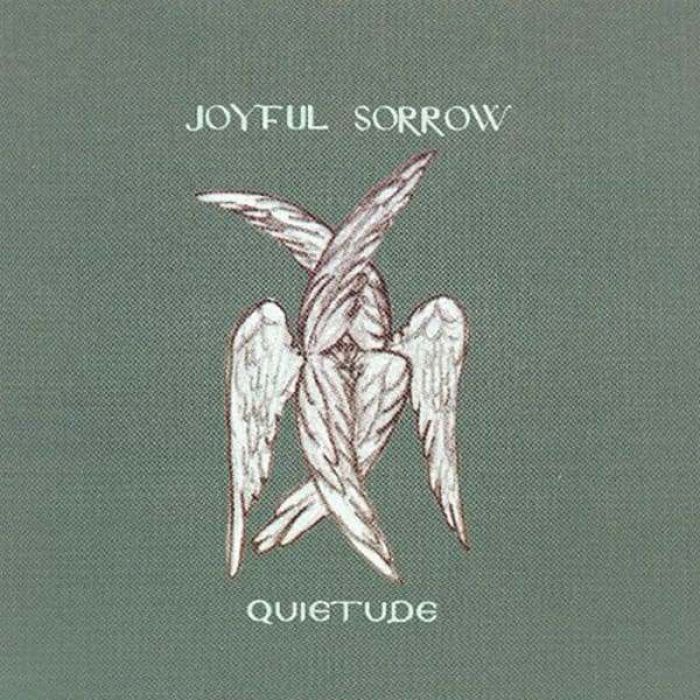Quietude by Joyful Sorrow (Review)

The use of icons in the Orthodox Church has often been seen as somewhat controversial (to put it mildly) by other Christians, especially those of a more Evangelical/Protestant bent. And while some abuse of this practice might exist (but then again, name a Christian practice that hasn’t been abused), the concept of icons is, at its core, a beautiful thing. Those who create icons believe that when Christ and the various Saints walked the Earth, they were not faceless creatures but rather individuals with distinct identities, appearances, and personalities. Icons are not meant to be exact replicas, but rather capture in some way, the inherent quality of the icon’s subject in order to convey some deeper spiritual meaning.
Such is the case with the songs on Quietude, the first album from Joyful Sorrow, a husband/wife duo of Eastern Orthodox Christians. They view their songs as musical icons, with each one on the album is inspired by the life of a particular saint.
In all reality, those outside Eastern Orthodoxy may not understand the songs’ references, and indeed, a little research was done in the course of this review to make some of the connections. Furthermore, it’s not clear how literal some of these songs are, or if, like Kieslowski’s “Decalogue,” the saints’ lives are used more for inspiration than narrative. But that matters little, because even if you don’t know that “To Be At War” refers to Saint Moses or the line “And now you’re wearing your dead husband’s clothes” refers to Saint Xenia, it won’t keep you from appreciating the duo’s simple, pretty music.
Admittedly, songs dealing with the lives of Saints could get a little heavy-handed. Thankfully, the lyrics do not become pedantic or preachy, nor do they present idealized, sterile interpretations of the Saints’ lives. Many songs detail struggles with sinful natures, trials, and even executions. Indeed, some of these tales are quite skewed and twisted, such as “Years Of Preparation,” which details Saint Isaiah’s sordid end (he was sawn in half). One could almost imagine Stuart Murdoch’s (Belle And Sebastian) clever pen behind some of these ballads, such as “Death Hung With Flowers,” whose protagonist is overcome with guilt for his role in the death of St. Dorothea.
But what really prevents these songs from becoming too overwrought is the band’s breezy, folk-influenced pop and the Zydeks’ clear, clean vocals (which sound doubly nice when engaged in harmony). Belle And Sebastian is a decent enough reference, but other bands in the quiet-pop register (Kings Of Convenience, Ida) as well as classic artists like Simon & Garfunkel also provide a good idea of what to expect. The opening track especially conjures up Simon & Garfunkel’s more solemn material, such as “Scarborough Fair.” The album’s strongest track, “To Be At War,” is also its breeziest and catchiest, its brushed drums and guitar filigrees occupying the same airy territory as The Clientele.
In addition, the songs often change moods and textures over the course of their 4 minutes or so. When “To The Desert” begins, its emphasis on cymbals and clean guitars has the same feel as Velour100, though not quite as atmospheric. But towards the end, the song grows darker and sparser, with sparkling keys and spartan guitars, its mood reminiscent of The Billions’ haunting work on “Quiet As It’s Kept.” The inverse is true on “Death Hung With Flowers,” which begins on a solemn note of lament and ends on a rather upbeat, triumphant note of salvation.
The only place where this approach really backfires is on “Mary,” which attempts to inject a heavier drumbeat and noisier guitar into the quiet ballad. The increased pace, despite lasting for a short time, feels quite out of step with the rest of the album, and also lends the lyrics some unneeded force. Thankfully, the song returns to its mellower pace before it ends. But that’s just one brief moment on the album. The rest of Quietude maintains the duo’s pretty folk-pop sound without attempting to bolster or rev it up somehow.
There’s something refreshing about artists whose beliefs are obviously reflected in their art, and yet whose art doesn’t suffer from being a mere pulpit from which to spout those beliefs. Joyful Sorrow is just such an example. No one would accuse them of being preachy or pushy. Their music is too simple and pretty for that. If anything, the overall mood of the piece is one of appreciation and tribute for these individuals who’ve obviously made an impression on the duo. There’s a heartfelt honesty that pervades this album, which means these songs are capable of leaving an impression that belies their delicate nature.